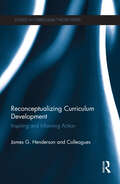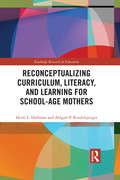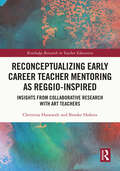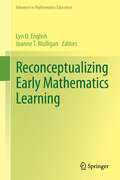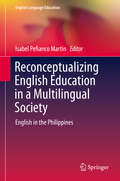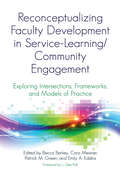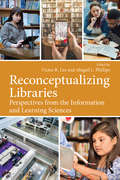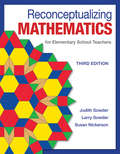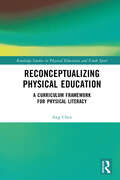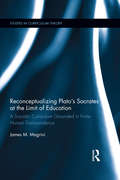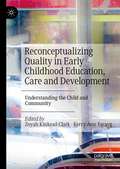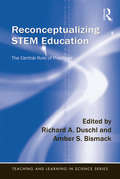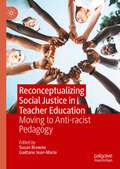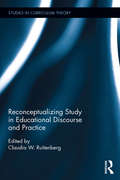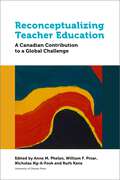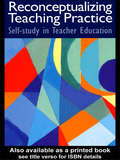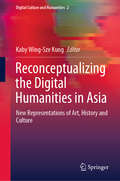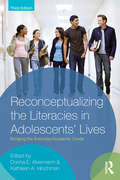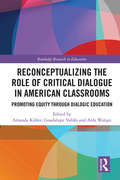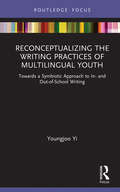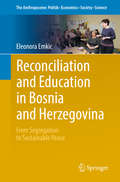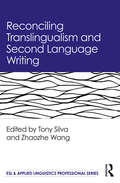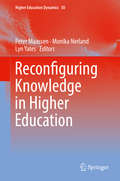- Table View
- List View
Reconceptualizing Curriculum Development: Inspiring and Informing Action (Studies in Curriculum Theory Series)
by James Henderson And ColleaguesReconceptualizing Curriculum Development provides accessible, clear guidance on curriculum problem solving and educational leadership through the practice of a synoptic curriculum study. This practice integrates three influential interpretations of curriculum—curriculum as deliberative artistry, curriculum as complicated conversation, and curriculum as currere—with John Dewey’s lifetime work on reflective inquiry. At its heart, the book advances a way of studying as a way of living with reference to the question: How might I live as a democratic educator? The study guidance is organized as an open-ended scaffolding of three embedded reflective inquiries informed by four deliberative conversations. Study recommendations are provided by a carefully selected team. The field-tested study-based approach is illustrated through a multi-layered, multi-voiced narrative collage of four experienced teachers’ personal journeys of understanding in a collegial study context. Applying William Pinar’s argument that a "conceptual montage" enabling teachers to lead complicated conversations should be the focus for curriculum development in the field’s current ‘post-reconceptualist’ moment, the book moves forward the educational aim of facilitating a holistic subject/self/social understanding through the practice of a balanced hermeneutics of suspicion and trust. It closes with a discussion of cross-cultural collaboration and advocacy, reflecting the interest of curriculum scholars in a wide range of countries in this study-based, lead-learning approach to curriculum development.
Reconceptualizing Curriculum, Literacy, and Learning for School-Age Mothers (Routledge Research in Education #31)
by Heidi L. Hallman Abigail P. KindelspergerReconceptualizing Curriculum, Literacy, and Learning for School-Age Mothers offers a portrait of classroom literacy practices and learning opportunities that are provided for school-age mothers in two different schools. Through a series of case studies of school sites, teachers, and students, this book presents evidence of how these at-risk students use literacy in complex ways in the classroom and in their everyday lives. Attuned to the struggle for school-age mothers’ access to meaningful and challenging curriculum in public schools, as well as to the relative dearth of scholarly research on the topic, this volume demonstrates how educators can rethink the issue of schooling for this population of students.
Reconceptualizing Early Career Teacher Mentoring as Reggio-Inspired: Insights from Collaborative Research with Art Teachers (Routledge Research in Teacher Education)
by Christina Hanawalt Brooke HofsessReconceptualizing Early Career Teacher Mentoring as Reggio-Inspired presents an innovative approach to early career art teacher mentoring informed by both the philosophy of Reggio Emilia and an ontology of immanence while simultaneously illuminating the experiences of the teacher-participants as co-inquirers within the contemporary milieu of public education in the United States. Readers are invited to travel with a group of teacher educators and early career PK-12 art teachers across a four-year journey to experience the evolving nature of a collaborative inquiry through mentoring-as-research, the Teacher Inquiry Group (TIG). The authors share significant insights regarding what it means to be an early career art teacher––especially in an educational climate steeped in neoliberal agendas, standardization, and accountability––and make potent suggestions for re-visioning entrenched approaches to mentoring and professional learning that better account for the inherent complexities of teaching in schools. Advocating for more complex understandings regarding teacher subjectivity and the contextual forces at work in schools, the authors provoke an expanded vision of how mentoring can be imagined, practiced, and lived in current educational contexts. The authors employ key orientations grounded in the Reggio Emilia philosophy to reimagine an under-researched and undertheorized area of study in art education-––early career teacher mentoring––that has implications for teachers at all levels and across all disciplines. This volume is essential reading for scholars and professionals across the fields of art education, teacher preparation, teacher education, and mentoring. It will appeal to educational researchers, K-12 practitioners, teacher educators, and administrators working with new teachers, as well as those interested in mentoring, Reggio Emilia, professional learning and development, art and aesthetic education, and emergent, process-oriented research methodologies.
Reconceptualizing Early Career Teacher Mentoring as Reggio-Inspired: Insights from Collaborative Research with Art Teachers (Routledge Research in Teacher Education)
by Christina Hanawalt Brooke HofsessReconceptualizing Early Career Teacher Mentoring as Reggio-Inspired presents an innovative approach to early career art teacher mentoring informed by both the philosophy of Reggio Emilia and an ontology of immanence while simultaneously illuminating the experiences of the teacher-participants as co-inquirers within the contemporary milieu of public education in the United States.Readers are invited to travel with a group of teacher educators and early career PK-12 art teachers across a four-year journey to experience the evolving nature of a collaborative inquiry through mentoring-as-research, the Teacher Inquiry Group (TIG). The authors share significant insights regarding what it means to be an early career art teacher––especially in an educational climate steeped in neoliberal agendas, standardization, and accountability––and make potent suggestions for re-visioning entrenched approaches to mentoring and professional learning that better account for the inherent complexities of teaching in schools. Advocating for more complex understandings regarding teacher subjectivity and the contextual forces at work in schools, the authors provoke an expanded vision of how mentoring can be imagined, practiced, and lived in current educational contexts. The authors employ key orientations grounded in the Reggio Emilia philosophy to reimagine an under-researched and undertheorized area of study in art education-––early career teacher mentoring––that has implications for teachers at all levels and across all disciplines. This volume is essential reading for scholars and professionals across the fields of art education, teacher preparation, teacher education, and mentoring. It will appeal to educational researchers, K-12 practitioners, teacher educators, and administrators working with new teachers, as well as those interested in mentoring, Reggio Emilia, professional learning and development, art and aesthetic education, and emergent, process-oriented research methodologies.
Reconceptualizing Early Mathematics Learning
by Joanne T. Mulligan Lyn D. EnglishThis book emanated primarily from concerns that the mathematical capabilities of young children continue to receive inadequate attention in both the research and instructional arenas. Research over many years has revealed that young children have sophisticated mathematical minds and a natural eagerness to engage in a range of mathematical activities. As the chapters in this book attest, current research is showing that young children are developing complex mathematical knowledge and abstract reasoning a good deal earlier than previously thought. A range of studies in prior to school and early school settings indicate that young learners do possess cognitive capacities which, with appropriately designed and implemented learning experiences, can enable forms of reasoning not typically seen in the early years. Although there is a large and coherent body of research on individual content domains such as counting and arithmetic, there have been remarkably few studies that have attempted to describe characteristics of structural development in young students' mathematics. Collectively, the chapters highlight the importance of providing more exciting, relevant, and challenging 21st century mathematics learning for our young students. The chapters provide a broad scope in their topics and approaches to advancing young children's mathematical learning. They incorporate studies that highlight the importance of pattern and structure across the curriculum, studies that target particular content such as statistics, early algebra, and beginning number, and studies that consider how technology and other tools can facilitate early mathematical development. Reconceptualising the professional learning of teachers in promoting young children's mathematics, including a consideration of the role of play, is also addressed.
Reconceptualizing English Education in a Multilingual Society
by Isabel Pefianco MartinThis book brings together chapters that describe, investigate, and analyze the place of English in education in multilingual Philippines. Unlike most studies on languages in education, which take a neutral, de-contextualized stance, this volume take a pluricentric view of the English language by positioning it in relation to its varieties, as well as to other languages in the country. Because of the changing realities of English in the Philippines, traditional assumptions about the language as monolithic and unchanging, as well as about how it should be taught and learned, need to be revisited and re-conceptualized.
Reconceptualizing Faculty Development in Service-Learning/Community Engagement: Exploring Intersections, Frameworks, and Models of Practice
by Becca Berkey, Cara Meixner, Patrick M. Green, and Emily A. EddinsThe role of educational developer in the realm of service-learning and community engagement (S-LCE) is multidimensional. Given the potentially transformational nature--for both faculty and students--of the experiences and courses in whose design they may be directly or indirectly involved, as well as their responsibility to the communities served by these initiatives, they have to be particularly attentive to issues of identity, values, and roles. As both practitioners and facilitators, they are often positioned as third-space professionals.This edited volume provides educational developers and community engagement professionals an analysis of approaches to faculty development around service-learning and community engagement. Using an openly self-reflective approach, the contributors to this volume offer an array of examples and models, as well as realistic strategies, to empower readers to evolve their faculty development efforts in service-learning and community engagement on their respective campuses. It is also a call for recognition that the practice of S-LCE needs to be institutionalized and improved. The book further addresses the field’s potential contributions to scholarship, such as the scholarship of teaching and learning (SoTL), publicly engaged scholarship, and collaborative inquiry, among others.The case studies provide an outline of program models and promising practices, including an authentic analysis of the institutional context within which they operate, the positionality of the practitioner-scholars overseeing them, the resources required, and the evidence related to both successes and challenges of these approaches.The contributed chapters are organized under four themes: the landscape of faculty development and community engagement; models of faculty development in S-LCE; challenges and opportunities in pedagogy and partnerships; and engendering change in educational development.
Reconceptualizing Libraries: Perspectives from the Information and Learning Sciences
by Victor R. Lee Abigail L. PhillipsReconceptualizing Libraries brings together cases and models developed by experts in the information and learning sciences to identify the potential for libraries to adapt and transform in the wake of new technologies for connected learning and discovery. Chapter authors explore the ways that the increased interest in the design research methods, digital media emphases, and technological infrastructure of the learning sciences can foster new collaborations and formats for education within physical library spaces. Models and case studies from a variety of library contexts demonstrate how library professionals can act as change agents and design partners and how patrons can engage with these evolving experiences. This is a timely and innovative volume for understanding how physical libraries can incorporate and thrive as educational resources using new developments in technology and in the learning sciences.
Reconceptualizing Mathematics for Elementary School Teachers, Third Edition
by Judith Sowder Larry Sowder Susan NickersonReconceptualizing Mathematics, founded on research and studies of learning and mathematics teaching for many years, is designed for use in classrooms in which students take an active part in learning and experience doing math. The esteemed author team has written the only textbook of its kind to both incorporate aspects of student-centered learning into lessons and model the teaching that will be expected of their students. To this end, the authors provide worthwhile tasks, activities, and support for facilitating discussions. Quantitative reasoning and problem solving are recurring themes in Reconceptualizing Mathematics. The authors approach problem solving that teaches students to understand the quantities embedded in the situation and how they relate to each other.
Reconceptualizing Physical Education: A Curriculum Framework for Physical Literacy (Routledge Studies in Physical Education and Youth Sport)
by Ang ChenPhysical education curricula evolved to emphasize physical training, personal hygiene, character development, fitness development, sports competency, and health. These emphases led to different ways to conceptualize the curricula for primary and secondary schools. This book raises a need to re-conceptualize the physical education curriculum and proposes a life-scan perspective for physical education curriculum conceptualization. Reconceptualizing Physical Education proposes a conceptual framework to focus on the life journey of physical activity, which is guided by the monist perspective and a lifelong approach to physical literacy. Section I of the book lays out important theoretical articulation for a two-dimensional framework with the goal of educating the learner to take a lifelong perspective to personal health and physically active lifestyles. Section II presents curriculum frameworks designed for primary schools and secondary schools. In each framework chapter, the details of content and learning tasks are discussed in terms of the two-dimensional functions. Each framework may be used directly for curriculum development. The book is intended for curriculum scholars and researchers in physical education, graduate students in health and physical education curriculum studies, and teachers in physical education and health education. It may also be of interest of researchers and graduate students in kinesiology fields and public health.
Reconceptualizing Physical Education: A Curriculum Framework for Physical Literacy (Routledge Studies in Physical Education and Youth Sport)
by Ang ChenPhysical education curricula evolved to emphasize physical training, personal hygiene, character development, fitness development, sports competency, and health. These emphases led to different ways to conceptualize the curricula for primary and secondary schools. This book raises a need to re-conceptualize the physical education curriculum and proposes a life-scan perspective for physical education curriculum conceptualization. Reconceptualizing Physical Education proposes a conceptual framework to focus on the life journey of physical activity, which is guided by the monist perspective and a lifelong approach to physical literacy. Section I of the book lays out important theoretical articulation for a two-dimensional framework with the goal of educating the learner to take a lifelong perspective to personal health and physically active lifestyles. Section II presents curriculum frameworks designed for primary schools and secondary schools. In each framework chapter, the details of content and learning tasks are discussed in terms of the two-dimensional functions. Each framework may be used directly for curriculum development. The book is intended for curriculum scholars and researchers in physical education, graduate students in health and physical education curriculum studies, and teachers in physical education and health education. It may also be of interest of researchers and graduate students in kinesiology fields and public health.
Reconceptualizing Plato’s Socrates at the Limit of Education: A Socratic Curriculum Grounded in Finite Human Transcendence (Studies in Curriculum Theory Series)
by James M. MagriniBridging the gap between interpretations of "Third Way" Platonic scholarship and "phenomenological-ontological" scholarship, this book argues for a unique ontological-hermeneutic interpretation of Plato and Plato’s Socrates. Reconceptualizing Plato’s Socrates at the Limit of Education offers a re-reading of Plato and Plato’s Socrates in terms of interpreting the practice of education as care for the soul through the conceptual lenses of phenomenology, philosophical hermeneutics, and ontological inquiry. Magrini contrasts his re-reading with the views of Plato and Plato’s Socrates that dominate contemporary education, which, for the most part, emerge through the rigid and reductive categorization of Plato as both a "realist" and "idealist" in philosophical foundations texts (teacher education programs). This view also presents what he terms the questionable "Socrates-as-teacher" model, which grounds such contemporary educational movements as the Paideia Project, which claims to incorporate, through a "scripted-curriculum" with "Socratic lesson plans," the so-called "Socratic Method" into the Common Core State Standards Curriculum as a "technical" skill that can be taught and learned as part of the students’ "critical thinking" skills. After a careful reading incorporating what might be termed a "Third Way" of reading Plato and Plato’s Socrates, following scholars from the Continental tradition, Magrini concludes that a so-called "Socratic education" would be nearly impossible to achieve and enact in the current educational milieu of standardization or neo-Taylorism (Social Efficiency). However, despite this, he argues in the affirmative that there is much educators can and must learn from this "non-doctrinal" re-reading and re-characterization of Plato and Plato’s Socrates.
Reconceptualizing Quality in Early Childhood Education, Care and Development: Understanding the Child and Community
by Zoyah Kinkead-Clark Kerry-Ann EscaygRecognizing the various ecological contexts that support children’s development while amplifying voices from across the globe, this book challenges narrow interpretations of quality and best practice. Each author offers a unique perspective on issues germane to the field of early childhood education: perceptions of children, curriculum, teacher education, and play-based learning. An innovative, timely, and much-needed contribution, this book represents an inclusive collection of theoretical and cultural knowledge, as well as research. Such a diverse multicentric lens opens new intellectual pathways for authentic, reciprocal knowledge exchange, while ensuring that a reimagining of early childhood education remains at the core of our teaching practice, scholarship, and activism. This book invites everyone to imagine, to dare to believe, to hope, and to act—in the interests of children, in the interests of communities and families, and in the moral precepts of equity, inclusion and justice.
Reconceptualizing STEM Education: The Central Role of Practices (Teaching and Learning in Science Series)
by Richard A. Duschl Amber S. BismackReconceptualizing STEM Education explores and maps out research and development ideas and issues around five central practice themes: Systems Thinking; Model-Based Reasoning; Quantitative Reasoning; Equity, Epistemic, and Ethical Outcomes; and STEM Communication and Outreach. These themes are aligned with the comprehensive agenda for the reform of science and engineering education set out by the 2015 PISA Framework, the US Next Generation Science Standards and the US National Research Council’s A Framework for K-12 Science Education. The new practice-focused agenda has implications for the redesign of preK-12 education for alignment of curriculum-instruction-assessment; STEM teacher education and professional development; postsecondary, further, and graduate studies; and out-of-school informal education. In each section, experts set out powerful ideas followed by two eminent discussant responses that both respond to and provoke additional ideas from the lead papers. In the associated website highly distinguished, nationally recognized STEM education scholars and policymakers engage in deep conversations and considerations addressing core practices that guide STEM education.
Reconceptualizing Social Justice in Teacher Education: Moving to Anti-racist Pedagogy
by Gaëtane Jean-Marie Susan BrowneThis edited volume explores and extends themes in contemporary educational research on teacher preparation and the evolution in social justice education to antiracist pedagogy. These times call for teacher education to reconsider how the work devoted to social justice is explicit and intentional about its commitment to a racially just society. What does it mean for teacher education to seize this moment to confront racism and inequities that continue to perpetuate in society and school? The book highlights efforts that are being augmented to prepare teacher candidates and future faculty to address systemic racism in their teaching practices.
Reconceptualizing Study in Educational Discourse and Practice (Studies in Curriculum Theory Series)
by Claudia W. RuitenbergAddressing studying as a distinct educational concept and phenomenon in its own right, the essays in this volume consider study and studying from a range of perspectives. Countering dominant educational discourses, which place a heavy emphasis on learning and instruction, the contributors explore questions such as: What does it mean to study something? How is studying something different from being taught about it, or learning something about it? What does the difficulty demanded by study mean for the one who studies and for the teacher? What mode of existence does study induce? The book highlights the significance of study not only, or even primarily, for its educational outcome, but as a human activity.
Reconceptualizing Teacher Education: A Canadian Contribution to a Global Challenge (Education)
by Anne M. Phelan, William F. Pinar, Nicholas Ng-A-Fook & Ruth KaneThis book counters the cultural homogenization of global policy. It examines the integrity of teacher education in particular places, serving particular communities, at particular historical moments. In this collection, Canadian scholars articulate a response to their collective concerns about the impact of global policy on teacher education, provoking a far-reaching dialogue about teacher education in and for our times. The first two decades of the new millennium have witnessed unprecedented appraisal, analysis, and educational policy formulations related to teaching (K–12) across the Western world. In turn, teacher education has been greatly impacted, as governments around the world see the reform and management of teacher education as a key component in restructuring education toward greater economic competitiveness. The result has been an unwarranted and undesirable level of standardization. It is vital to the future of teacher education, and concomitantly public education, that we imagine alternatives to the homogenization of the educational experience that globalizing policies install. What is needed are vocabularies that enable educators and teacher educators to discern and articulate educational purposes beyond capital and which focus on the kinds of educational experiences that can help prepare the young to lead good and worthwhile lives. Using lessons learned from the Canadian context, the authors identify and investigate the importance of initial and continuing professional education that fosters teachers’ intellectual freedom and study; advances an informed and critical appreciation of civic particularity and historical circumstance; and cultivates ethical (i.e., pedagogical) engagement with ideas and histories—teachers’ own and their students—as crucial themes of teacher education globally. Published in English.
Reconceptualizing Teaching Practice: Developing Competence Through Self-Study
by Mary Lynn HamiltonOver the past ten years there has been increased interest in research on various aspects of teacher education, ranging from the preparation of teachers to continuing professional development. The increase of interest in how teachers become competent in very complex social settings is a result of a general recognition by researchers and policy makers alike that teachers are the key to any serious efforts at educational reform. This book addresses a variety of issues surrounding the field of inquiry into teaching practice that has become known as 'self-study', equivalent in many ways to the 'action research' movement, but at tertiary level.
Reconceptualizing the Digital Humanities in Asia: New Representations of Art, History and Culture (Digital Culture and Humanities #2)
by Kaby Wing-Sze KungThis book examines new forms of representation that have changed our perception and interpretation of the humanities in an Asian, and digital, context. In analyzing written and visual texts, such as the use of digital technology and animation in different works of art originating from Asia, the authors demonstrate how literature, history, and culture are being redefined in spatialized relations amid the trend of digitization. Research studies on Asian animation are in short supply, and so this volume provides new and much needed insights into how art, literature, history, and culture can be presented in innovative ways in the Asian digital world. The first section of this volume focuses on the new conceptualization of the digital humanities in art and film studies, looking at the integration of digital technologies in museum narration and cinematic production. The second section of the volume addresses the importance of framing these discussions within the context of gender issues in the digital world, discussing how women are represented in different forms of social media. The third and final section of the book explores the digital world’s impacts on people’s lives through different forms of digital media, from the electromagnetic unconscious to digital storytelling and digital online games. This book presents a novel contribution to the burgeoning field of the digital humanities by informing new forms of representation and interpretations, and demonstrating how digitization can influence and change cultural practices in Asia, and globally. It will be of interest to students and scholars interested in digitization from the full spectrum of humanities disciplines, including art, literature, film, music, visual culture, media, and animation, gaming, and Internet culture."This is a well-written book, and I enjoyed reading it. The first impression of the book is that it is very innovative - a down-to-the-earth academic volume that discusses digital culture."- Professor Anthony Fung, Professor, Director, School of Journalism and Communication, The Chinese University of Hong Kong "This book has contributed to the existing field of humanities by informing new forms of representation and interpretations, and how digitization may change cultural practices. There is comprehensive information on how the humanities in the digital age can be applied to a wide range of subjects including art, literature, film, pop music, music videos, television, animation, games, and internet culture."- Dr Samuel Chu, Associate Professor, The Faculty of Education, The University of Hong Kong
Reconceptualizing the Literacies in Adolescents' Lives: Bridging the Everyday/Academic Divide, Third Edition
by Kathleen A. Hinchman Donna E. AlvermannLike previous editions, the third edition of Reconceptualizing the Literacies in Adolescents’ Lives invites middle- and high-school educators to move toward a broad, generative view of adolescent literacies. Recognizing that digital media, social networking phenomena are now central in adolescents’ lives, what is different is the focus in this edition on bridging students’ everyday literacies and subject matter learning. Four chapters from earlier editions serve as touchstone texts, honoring youth’s diverse experiences and illustrating how young people’s literacies are enacted, situated, and mediated in various locales; nine new chapters consider how these themes are lived in today’s schools and in the rapidly changing world outside of school This edition features heightened attention multimodal meaning construction, more discussion of practical implications of the ideas presented, and co-authored teacher commentaries at the end of each section. A Companion Website, new for this edition, facilitates practical application of the text’s key ideas, with discussion questions, and links to instructional activities, blogs, additional readings and viewings, and interactive web pages, and videos.
Reconceptualizing the Role of Critical Dialogue in American Classrooms: Promoting Equity through Dialogic Education (Routledge Research in Education)
by Amanda Kibler; Guadalupe Valdés; Aída WalquiAcknowledging teacher and student dialogue as key to student development, this volume takes a critical perspective on notions of classroom participation, extending previous scholarship to illustrate how critical, dialogic pedagogies can promote equity and inclusivity. In proposing and outlining the parameters of "critical dialogic education," the contributors to this volume document and discuss examples of classroom discourse practices that challenge the monolithic and uncritical discourse practices that traditionally silence minoritized students. Chapters draw on a range of empirical studies and present multimodal data to consider aspects of teacher education; classroom environments; and curricular innovations which promote critical and dialogical student interaction, civic engagement, and linguistic versatility. This book will be of interest to scholars, postgraduate students, and researchers working in the fields of language, classroom discourse, social justice, and critical pedagogies, as well as teacher educators and professional development leaders who work with classroom teachers.
Reconceptualizing the Writing Practices of Multilingual Youth: Towards a Symbiotic Approach to In- and Out-of-School Writing (Routledge Research in Literacy Education)
by Youngjoo YiFocusing on adolescent multilingual writing, this text problematizes the traditional boundaries between academic writing in school contexts and self-initiated writing outside of the formal learning environment. By reconceptualizing the nature of adolescent multilingual writing, the author establishes it as an interdisciplinary genre and a key area of inquiry for research and pedagogy. Organized into six chapters, Reconceptualizing the Writing Practices of Multilingual Youth provides an in-depth examination of the writing practices of multilingual youth from sociocultural and social practice perspectives. Drawing on first-hand research conducted with young people, the text questions the traditional dichotomy between academic writing and non-formal equivalents and proposes a symbiotic approach to exploring and cultivating the connections between in- and out-of-school literate lives. By highlighting a bidirectional relationship between formal and informal writing, the text advocates for writing instruction that helps adolescents use writing for entertainment, identity construction, creative expression, personal well-being, and civic engagement, as well as helps them learn to navigate future literacies that we cannot imagine or predict now. This much-needed text will provide researchers and graduate students with a principled overview and synthesis of adolescent multilingual writing research that is significant yet underexplored in applied linguistics, TESOL, and literacy studies.
Reconciliation and Education in Bosnia and Herzegovina
by Eleonora EmkicTwo decades after the war, Bosnia and Herzegovina (BiH) still faces a weak national identity and ethnic and religious divisions that are further preventing the country from reaching sustainable peace and development. The education system is also divided along ethnic and religious lines. This study discusses research questions about challenges BiH has been facing on its way to peace transformation; about relation between the current educational system and development of sustainable peace in BiH; as well as to answer how to achieve positive and sustainable peace in BiH through peace education. In order to offer a peacebuilding framework the study offers an analysis of the role of education and educational programmes (formal and non-formal) in the creation of ethnic identity and peaceful coexistence in BiH since the Ottoman Empire until today. The study relies on interviews with stakeholders from BiH about gaps in the peacebuilding process, education system and suggestions for improvement.
Reconciling Translingualism and Second Language Writing (ESL & Applied Linguistics Professional Series)
by Tony Silva; Zhaozhe WangThis book brings together top scholars on different sides of the important scholarly debate between the translingual movement and the field of second language writing. Drawing on a wide range of perspectives, this volume examines the differences in theory and practice with the hope of promoting reconciliation between the two schools of thought. Chapters address the tensions in the relationship between translingualism and second language writing and explore programs, pedagogies, and research that highlight commonalities between the two camps. With contributions from leading scholars, this book comprehensively addresses the issues related to this contentious debate and offers ways to bring the two camps into conversation with one another in a way that promotes effective teaching practices. By providing a panoramic view of the current situation, the text is a timely and unique contribution to TESOL, applied linguistics, and composition studies.
Reconfiguring Knowledge in Higher Education (Higher Education Dynamics Ser. #50)
by Peter Maassen Lyn Yates Monika NerlandKnowledge is now central to national economic competitiveness and to socio-economic endeavours concerned with inequalities and social exclusion, and in this context higher education is recognized as a core sector of national policy and strategy. Yet the changing pressures, directions and practices in relation to knowledge pose many challenges for higher education itself. How can and how should research and study programs within higher education align with wider knowledge dynamics? How can higher education prepare students in professional fields for different kinds of knowledge-intensive work practices? How can short term economic objectives for higher education be aligned with other kinds of knowledge objectives that have characterized universities and colleges, and with the intensified impact of global rankings? This book takes as its focus the core interest of higher education in knowledge, and takes as its object of inquiry the kinds of reconfiguration of knowledge evident in national policies and governance; and in the redevelopment and practices of a range of professional and academic study programs in higher education institutions in Norway and Australia. From these detailed accounts, the book demonstrates the complexity of knowledge as an object of policy and practice; the competing logics that may be evident within and between study programs and policies; and the different kinds of agents and drivers that are part of knowledge reconfiguration in higher education and that need further attention going forward.
